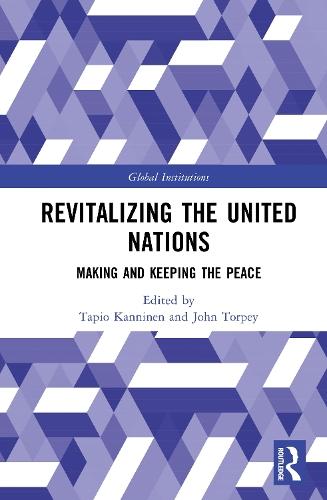Overview
This book explores whether the United Nations (UN) is relevant in resolving wars when the permanent members of the UN Security Council are directly or indirectly involved. It examines solutions to major wars by applying and testing the UN’s vast experience in mediating and deploying peacekeeping, demilitarization, truce monitoring, UN temporary administration, and other tools. While some observers see the organization in deep decline as the Security Council cannot agree to stop the wars in Ukraine and Gaza, the expert contributors to this volume make the case that until the start of this century the UN played a critically important role in resolving and freezing major conflicts, and the renewal of the organization could be based on these and other successful precedents. This volume will be of interest to scholars and students of global governance, security studies, and the history of the UN in the maintenance of international peace and security. It will also be of great interest to practitioners at the UN and its partner organizations, as well as to diplomats around the world. The Open Access version of this book, available at http://www.taylorfrancis.com, has been made available under a Creative Commons Attribution-Non Commercial-No Derivatives (CC BY-NC-ND) 4.0 license.
Full Product Details
Author: Tapio Kanninen ,
John Torpey
Publisher: Taylor & Francis Ltd
Imprint: Routledge
Weight: 0.760kg
ISBN: 9781032911410
ISBN 10: 1032911417
Pages: 300
Publication Date: 29 October 2025
Audience:
College/higher education
,
Tertiary & Higher Education
Format: Hardback
Publisher's Status: Active
Availability: Not yet available

This item is yet to be released. You can pre-order this item and we will dispatch it to you upon its release.
Reviews
""Understanding the UN’s contemporary relevance requires moving beyond simplistic narratives of institutional success or failure. Instead, we must examine how the organization’s historical foundations, current operations, and potential for reform intersect with the evolving nature of global challenges. This volume aims to contribute to this critical conversation by analyzing the UN's capacity to adapt its mission, structure, and operations to a rapidly changing international landscape while preserving the core principles that have guided it for nearly eight decades."" - From the Foreword by Maria Fernanda Espinosa, former Foreign and Defence Minister of Ecuador and President of the UN General Assembly “With the United Nations in particular and multilateralism in general under siege, readers will be relieved that Kanninen and Torpey have assembled contributors who recall the essential role of both in many previous conflicts and negotiations. Surely, that capacity will soon be required again.” - Thomas G. Weiss, Presidential Professor Emeritus, Political Science, and Director Emeritus, Ralph Bunche Institute for International Studies, CUNY Graduate Center
""Understanding the UN’s contemporary relevance requires moving beyond simplistic narratives of institutional success or failure. Instead, we must examine how the organization’s historical foundations, current operations, and potential for reform intersect with the evolving nature of global challenges. This volume aims to contribute to this critical conversation by analyzing the UN's capacity to adapt its mission, structure, and operations to a rapidly changing international landscape while preserving the core principles that have guided it for nearly eight decades."" From the Foreword by Maria Fernanda Espinosa, former Foreign and Defence Minister of Ecuador and President of the UN General Assembly “With the United Nations in particular and multilateralism in general under siege, readers will be relieved that Kanninen and Torpey have assembled contributors who recall the essential role of both in many previous conflicts and negotiations. Surely, that capacity will soon be required again.” Thomas G. Weiss, Presidential Professor Emeritus, Political Science, and Director Emeritus, Ralph Bunche Institute for International Studies, CUNY Graduate Center
Author Information
Tapio Kanninen is Senior Fellow and Director of the Major Wars Project at the Ralph Bunche Institute for International Studies at the Graduate Center of the City University of New York, where he earned his Ph.D. in Political Science in 1990. He is also President of the Global Crisis Information Network Inc. He was Chief of the Policy Planning in the UN Department of Political Affairs (1998–2005) and Head of the Secretariat of Kofi Annan’s five Summits with Regional Organizations. John Torpey is Presidential Professor of Sociology and History and Director of the Ralph Bunche Institute for International Studies at the Graduate Center, City University of New York. Among other works, he is the author of Making Whole What Has Been Smashed: On Reparations Politics (2006; paperback 2017) and co-editor (with David Jacobson) of Transformations of Warfare in the Contemporary World (2016). In 2016–2017, he was President of the Eastern Sociological Society.



